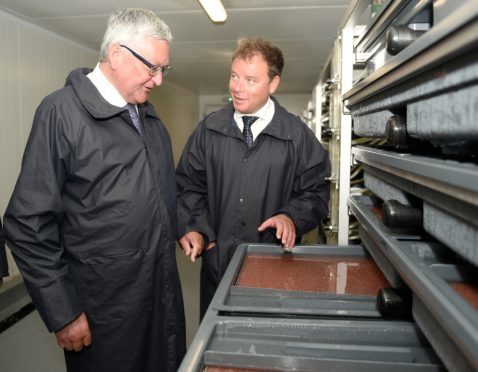One is a TV star and author who enjoys a good day’s fishing – the other is a senior Scottish politician with responsibility for the rural economy.
But last night, Jeremy Paxman and Fergus Ewing were unlikely sparring partners in a slightly sweary row about fish farms.
Mr Paxman has criticised the industry – and the Scottish Government’s part in it – in a recent documentary for Icelandic television.
And yesterday, as he opened a fish hatchery in the Highlands, Mr Ewing hit out at “metropolitan critics” – seen as a thinly-veiled dig at Mr Paxman.
Mr Ewing was the new hatchery is “great news for the West Highlands and for Scotland” but he accused critics of aqua culture of not seeing the wood for the trees.
He said: “All in all this facility here will help to sustain communities on the edge of the Highlands and Islands and that is something that many metropolitan critics of the aquaculture sector don’t seem to be willing to recognise.
“And sometimes I wish they could have a wee look for themselves before propounding about things from hundreds of miles of distance.”
But on hearing about Mr Ewing’s quotes, Mr Paxman offered a rebuttal himself, referring to Mr Ewing in less-than-glowing terms.
He said: “If the Scottish government wants to b***** up the nation’s environment that is its own affair.
“But spare us the blathering nonsense of a speak-your-weight machine nincompoop. Salmon farms are a menace, full stop.”
Mr Ewing opened Marine Harvest’s new £26.2million Glenmoriston facility.
The investment by the fish farming giant will see 18 jobs on site and many more secured region-wide as it will produce almost 50% of the company’s salmon – around 10 million fish.
At full capacity the Inchmore hatchery will use around 250 tons of water a day with only 0.5% of that becoming waste.
That water is used for the 48 tanks where the fish grow and mature before being released into fish farms either on fresh water lochs or in the sea.
Mr Ewing acknowledged there were “challenges facing the aquaculture sector” but he was “confident” the Fish Health Framework which was launched in May would help deal with them.
He said: “We seek to overcome the challenges that the sector has been facing and already sea lice numbers are at their lowest in several years.”
